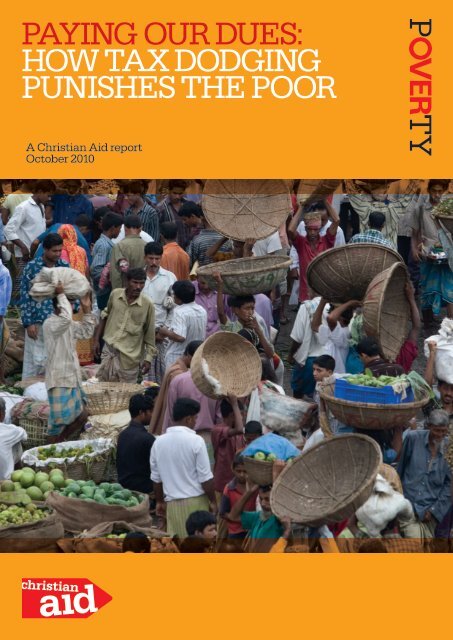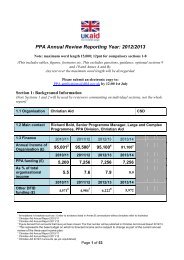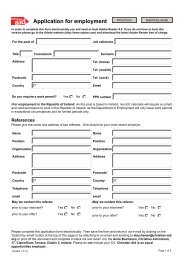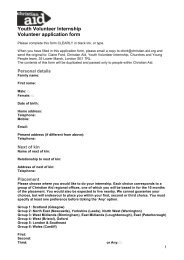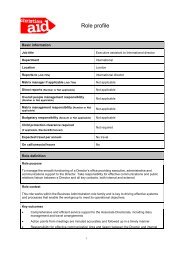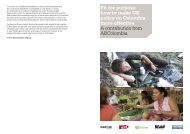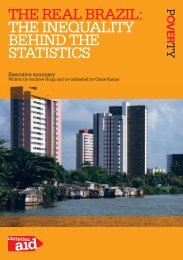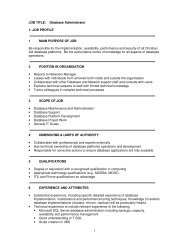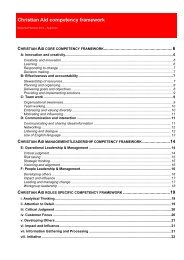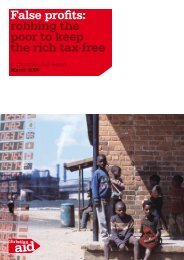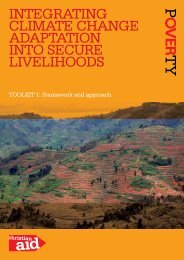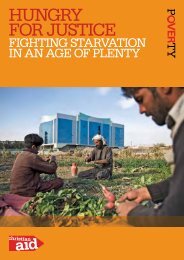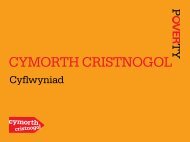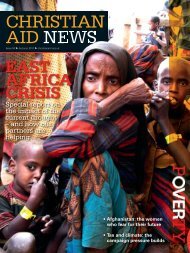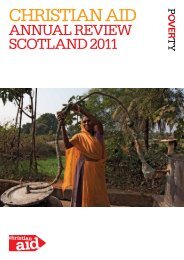paying our dues: how tax dodging punishes the poor - Christian Aid
paying our dues: how tax dodging punishes the poor - Christian Aid
paying our dues: how tax dodging punishes the poor - Christian Aid
Create successful ePaper yourself
Turn your PDF publications into a flip-book with our unique Google optimized e-Paper software.
PAYING OUR DUES:<br />
HOW TAX DODGING<br />
PUNISHES THE POOR<br />
A <strong>Christian</strong> <strong>Aid</strong> report<br />
October 2010
2 Paying Our Dues<br />
Paying Our Dues 3<br />
FOREWORD<br />
In <strong>poor</strong> countries where <strong>the</strong> <strong>tax</strong> base is very<br />
small and millions live on subsistence incomes,<br />
it is shameful that companies which make<br />
large profits from <strong>the</strong> res<strong>our</strong>ces of <strong>the</strong>se<br />
countries should be <strong>dodging</strong> fair <strong>tax</strong>es<br />
‘Dear friends, do you<br />
think you’ll get anywhere<br />
in this if you learn all <strong>the</strong><br />
right words but never do<br />
anything Does merely<br />
talking about faith<br />
indicate that a person<br />
really has it For instance,<br />
you come upon an old friend dressed<br />
in rags and half-starved and say, ‘Good<br />
morning, friend! Be clo<strong>the</strong>d in Christ!<br />
Be filled with <strong>the</strong> Holy Spirit!’ and walk<br />
off without providing so much as a coat<br />
or a cup of soup – where does that<br />
get you Isn’t it obvious that Godtalk<br />
without God-acts is outrageous<br />
nonsense’ – James 2:14-17 1<br />
Faith and action are inseparable.<br />
Jesus’ teachings and <strong>the</strong> inspiration<br />
of <strong>the</strong> Holy Spirit call us to give thanks<br />
for what is good and to challenge what<br />
is evil. Global poverty is <strong>the</strong> shame<br />
of <strong>the</strong> world. The eight millennium<br />
development goals are some of <strong>the</strong><br />
noblest aspirations of <strong>our</strong> time.<br />
However, with just five years to go until<br />
<strong>the</strong> 2015 millennium development goal<br />
deadline, many <strong>poor</strong> countries are still a<br />
long way from eradicating absolute poverty.<br />
Rt Rev John Christie<br />
Moderator of <strong>the</strong> General Assembly of <strong>the</strong> Church of Scotland<br />
UN Secretary-General Ban Ki-moon<br />
says: ‘It is clear that improvements<br />
in <strong>the</strong> lives of <strong>the</strong> <strong>poor</strong> have been<br />
unacceptably slow, and some hardwon<br />
gains are being eroded by <strong>the</strong><br />
climate, food and economic crises.’ 2<br />
Five years ago <strong>the</strong> leaders of <strong>the</strong><br />
G8 nations met here in Scotland,<br />
in Gleneagles. Churches and aid<br />
agencies joined forces as part of<br />
<strong>the</strong> MAKEPOVERTYHISTORY<br />
campaign, calling for more aid,<br />
debt relief and fairer global trade<br />
practices. Today <strong>tax</strong> <strong>dodging</strong> by<br />
multinational corporations is seen<br />
as a major barrier to development.<br />
The Letter of James challenges<br />
us to work against injustice and<br />
speak on behalf of <strong>the</strong> vulnerable,<br />
<strong>the</strong> <strong>poor</strong>est and <strong>the</strong> marginalised.<br />
I am commending this report to<br />
all members and ministers of <strong>the</strong><br />
Church of Scotland. I welcome<br />
this report as a way of setting<br />
<strong>the</strong> context, both in terms of <strong>the</strong><br />
practical economics as well as<br />
<strong>the</strong> <strong>the</strong>ological underpinning<br />
for <strong>how</strong> we as <strong>Christian</strong>s might<br />
approach <strong>the</strong>se issues.<br />
Introduction<br />
Developed countries like Scotland depend on <strong>tax</strong>ation for<br />
<strong>the</strong> wide range of public services that are essential for a<br />
functioning and stable society. There is no developed<br />
democracy that does not have a highly developed <strong>tax</strong>ation<br />
system. William Pitt <strong>the</strong> Younger first introduced income <strong>tax</strong><br />
to Britain in 1798. Before that, rich elites held capital, power<br />
and almost all <strong>the</strong> land, especially after enclosure of <strong>the</strong><br />
commons. For <strong>the</strong> <strong>poor</strong>, <strong>the</strong> vast majority, life was relentless<br />
drudgery, grinding poverty, dependence on charity and utter<br />
insecurity. This is what we know about <strong>the</strong> importance of <strong>tax</strong>ation.<br />
But <strong>the</strong>re is one aspect of <strong>tax</strong>ation that has been called<br />
‘<strong>the</strong> ugliest chapter in global economic affairs since slavery’.<br />
It concerns <strong>the</strong> manner in which businesses, in particular<br />
multinational corporations, shift billions of pounds of profits<br />
between jurisdictions (countries or regions with <strong>tax</strong> authority)<br />
to reduce, or even dodge completely, <strong>the</strong>ir <strong>tax</strong> bill.<br />
What makes this a matter of particular concern is <strong>the</strong> impact<br />
such <strong>tax</strong> <strong>dodging</strong> has on <strong>the</strong> global economy. Especially<br />
in <strong>poor</strong> countries where <strong>the</strong> <strong>tax</strong> base is very small and<br />
millions live on subsistence incomes, it is shameful that<br />
companies which make large profits from <strong>the</strong> res<strong>our</strong>ces<br />
of <strong>the</strong>se countries should be <strong>dodging</strong> fair <strong>tax</strong>es. Therefore,<br />
<strong>the</strong> Church and Society Council worked with <strong>Christian</strong><br />
<strong>Aid</strong> Scotland to report on <strong>the</strong>se practices to <strong>the</strong> General<br />
Assembly of 2010, which agreed <strong>the</strong> following deliverances.<br />
The Assembly:<br />
• Recognises <strong>the</strong> importance of <strong>tax</strong>ation in <strong>poor</strong><br />
countries for ensuring sustainable development<br />
finance and building accountability between state<br />
and citizen<br />
• Instructs <strong>the</strong> Church and Society Council to raise<br />
with HM Government <strong>the</strong> concern regarding <strong>the</strong><br />
negative impacts of <strong>tax</strong> evasion and avoidance<br />
which are estimated to cost <strong>poor</strong> countries US$160<br />
billion each year<br />
• Welcomes <strong>the</strong> commitment from <strong>the</strong> Organisation<br />
for Economic Cooperation and Development (OECD),<br />
supported by <strong>the</strong> UK government, to include a<br />
country-by-country reporting standard in <strong>the</strong>ir<br />
Guidelines for Multinational Corporations by <strong>the</strong><br />
end of 2010 and seeks to see this extended to an<br />
international binding standard for all multinational<br />
companies.<br />
In giving <strong>the</strong> report, <strong>the</strong> Convener of <strong>the</strong> Church and Society<br />
Council, Rev Ian Galloway, said: ‘The <strong>poor</strong> of <strong>the</strong> world<br />
need champions who will stand in <strong>the</strong> face of economic and<br />
political powers… We need to stand up and be counted in<br />
that confrontation with injustice.’<br />
This short report has been produced by <strong>Christian</strong> <strong>Aid</strong> Scotland<br />
to assist presbyteries and congregations in exploring and<br />
understanding <strong>the</strong> sometimes complex issues involved in<br />
<strong>tax</strong> evasion and avoidance. It also offers some biblical and<br />
<strong>the</strong>ological reflection on <strong>tax</strong>ation and is one of a number<br />
of res<strong>our</strong>ces for thinking, reflecting and praying on <strong>the</strong> issue<br />
of <strong>tax</strong> and international development. Tax justice is a key area<br />
of campaigning and advocacy for <strong>Christian</strong> <strong>Aid</strong> and we hope<br />
that <strong>the</strong> report will support Church of Scotland congregations<br />
and individual members in taking appropriate action.<br />
The importance of <strong>tax</strong>ation<br />
For <strong>Christian</strong> <strong>Aid</strong>, <strong>the</strong> ability of a state to generate revenue<br />
through an effective <strong>tax</strong> system has many benefits.<br />
It provides much-needed revenue which can be spent<br />
on public services, and reduces state dependency on<br />
overseas aid, placing <strong>the</strong> ownership of a country’s<br />
development back in <strong>the</strong> hands of its government.<br />
Tax also promotes good governance, active citizenship<br />
and mutual accountability between state and citizen. 3<br />
It is important that <strong>the</strong> citizens know <strong>how</strong> much <strong>the</strong>ir<br />
country is receiving in revenue – so that <strong>the</strong> government<br />
can be held to account for <strong>how</strong> those revenues are spent.<br />
Taxes are <strong>the</strong> vital link between governments and societies.<br />
Investors often consider strong <strong>tax</strong> administrations to<br />
be an indication of good governance and stability, 4 which,<br />
in turn, creates an environment in which society can fulfil<br />
its potential. In addition for businesses, it is preferable to<br />
be located in countries where investments are protected<br />
by stable judicial systems, where <strong>the</strong>re are good roads,<br />
an educated population and where <strong>the</strong> electricity doesn’t<br />
cut out every o<strong>the</strong>r h<strong>our</strong>.<br />
There is now a heightened awareness and deeper<br />
appreciation of <strong>the</strong> dangers of unregulated financial<br />
operations of banks and companies, and a growing<br />
demand that financial institutions be subject to more<br />
stringent standards of transparency and oversight.<br />
Yet, while <strong>tax</strong> is considered to be <strong>the</strong> lifeblood of stable<br />
economies, many developing countries face significant<br />
challenges in raising revenues. A large informal sector<br />
makes it difficult to collect <strong>tax</strong>, while weak revenue<br />
authorities and a lack of trust in government toge<strong>the</strong>r<br />
mean that many developing countries raise less than<br />
15 per cent of <strong>the</strong>ir gross domestic product (GDP)<br />
in <strong>tax</strong> – compared with around 30 per cent in OECD<br />
countries. In addition to <strong>the</strong>se domestic challenges,<br />
globalisation has resulted in significant challenges for<br />
developing countries, particularly when seeking to <strong>tax</strong><br />
multinational companies.
4 Paying Our Dues<br />
Paying Our Dues 5<br />
Approximately 60 per cent of all<br />
world trade now takes place within,<br />
ra<strong>the</strong>r than between, multinational<br />
corporations through trading between<br />
related subsidiaries<br />
International <strong>tax</strong> <strong>dodging</strong> gives an unfair<br />
advantage to multinational companies,<br />
leaving domestic businesses unable to<br />
compete on a level playing field<br />
and disc<strong>our</strong>aging growth<br />
The cost of <strong>tax</strong> <strong>dodging</strong><br />
<strong>Christian</strong> <strong>Aid</strong> estimates that just two forms of <strong>tax</strong> <strong>dodging</strong>,<br />
transfer mispricing and false invoicing, cost developing<br />
countries US$160 billion every year. That is roughly one<br />
and half times <strong>the</strong> world’s annual aid budget.<br />
In <strong>the</strong> short term, aid still has a role to play in ensuring<br />
<strong>the</strong> world’s <strong>poor</strong>est people are protected from <strong>the</strong> worst<br />
effects of <strong>the</strong> financial crisis and in addressing capacity<br />
gaps in developing countries. The Scottish government<br />
made a commitment to play its part in helping to achieve<br />
<strong>the</strong> UN’s millennium development goals (MDGs) through<br />
establishing <strong>the</strong> International Development Fund. In 2008,<br />
£13 million was committed to support projects in five of <strong>the</strong><br />
<strong>poor</strong>est countries in <strong>the</strong> world: Malawi, Zambia, Tanzania,<br />
Rwanda and <strong>the</strong> Darfur region of Sudan. A fur<strong>the</strong>r £2 million<br />
was added to <strong>the</strong> fund in 2010 for projects in Bangladesh,<br />
India, Pakistan and Sri Lanka. However, <strong>the</strong> scale of <strong>the</strong><br />
money lost to <strong>the</strong>se countries between 2005 and 2008<br />
through <strong>tax</strong> <strong>dodging</strong> by unscrupulous businesses operating<br />
internationally – over £4 billion – clearly demonstrates it<br />
is crucial in <strong>the</strong> longer term for governments to address<br />
<strong>the</strong> secrecy of <strong>the</strong> global financial system which prevents<br />
developing countries accessing <strong>the</strong> <strong>tax</strong> revenue <strong>the</strong>y are due.<br />
The Scottish government is to be commended for stating<br />
in 2008 that despite budgetary pressures it would not<br />
renege on its aid budget. However, in <strong>the</strong> words of <strong>the</strong><br />
former South African finance minister, Trevor Manuel: ‘It is a<br />
contradiction to support increased development assistance,<br />
yet turn a blind eye to actions by multinationals and o<strong>the</strong>rs<br />
that undermine <strong>the</strong> <strong>tax</strong> base of a developing country.’<br />
Tax <strong>dodging</strong> practices<br />
Approximately 60 per cent of all world trade now<br />
takes place within, ra<strong>the</strong>r than between, multinational<br />
corporations through trading between related subsidiaries. 5<br />
‘Transfer pricing’ is <strong>the</strong> sale of goods and services between<br />
branches of <strong>the</strong> same transnational company. International<br />
guidelines suggest that as long as <strong>the</strong> company’s subsidiaries<br />
charge each o<strong>the</strong>r a fair market price (known as an ‘arm’s<br />
length price’) <strong>the</strong>n <strong>the</strong> transactions are legitimate.<br />
Illegitimacy arises when multinational corporations<br />
manipulate <strong>the</strong> price of exports and imports traded<br />
between <strong>the</strong>ir subsidiaries – sometimes inflating,<br />
sometimes deflating prices. For example, a consignment<br />
of hairdryers was exported to Nigeria at a cost of<br />
US$3,800 per hairdryer when <strong>the</strong> market price of that<br />
model was US$25. 6 Such practices can have <strong>the</strong> effect<br />
of reducing a company’s profits in specific countries and<br />
thus <strong>the</strong>ir <strong>tax</strong> liability. Often developing countries lack <strong>the</strong><br />
relevant legislation, as well as <strong>the</strong> capacity and expertise<br />
to monitor transfer pricing and call companies to account<br />
for abusive behavi<strong>our</strong>.<br />
Tax havens offer low or zero <strong>tax</strong> rates as well as<br />
secrecy for companies which wish to conceal <strong>the</strong>ir<br />
profits, particularly where <strong>the</strong> rate applies to individuals<br />
or companies with minimal presence within <strong>the</strong> country.<br />
This impedes o<strong>the</strong>r jurisdictions from imposing appropriate<br />
<strong>tax</strong>es. Fifty percent of world trade is now reported to<br />
take place through <strong>tax</strong> havens. 7<br />
Table 1- Estimated lost <strong>tax</strong> revenue from bilateral trade to EU and US (million £) to countries supported by <strong>the</strong><br />
Scottish Government as a result of trade mispricing 8<br />
Countries 2005 2006 2007 Totals<br />
Bangladesh 35.56 40.37 108.32 184.25<br />
India 675.57 2111.28 815.20 3602.05<br />
Pakistan 124.00 85.59 95.40 304.99<br />
Sri Lanka 51.03 45.45 42.78 139.26<br />
Malawi 1.14 0.55 0.83 2.52<br />
Rwanda 0.19 0.25 0.20 0.64<br />
Sudan 4.55 5.16 3.23 12.94<br />
Tanzania 3.08 5.27 9.07 17.42<br />
Zambia 0.54 1.20 1.15 2.89<br />
Total 895.66 2295.12 1076.18 4,266.96<br />
Supporting local business<br />
One of <strong>the</strong> most damaging effects of large-scale <strong>tax</strong> <strong>dodging</strong><br />
in developing economies is <strong>the</strong> negative effect it has on <strong>the</strong><br />
progression of small domestic enterprises into mid-sized<br />
enterprises. As <strong>the</strong> opportunity to dodge <strong>tax</strong> internationally is<br />
effectively only open to companies with cross-border trade, <strong>tax</strong><br />
<strong>dodging</strong> introduces a systematic bias in national economies in<br />
fav<strong>our</strong> of large multinational companies, working against broadbased,<br />
pro-<strong>poor</strong> economic growth.<br />
In developing countries this often leads to a phenomenon<br />
known as <strong>the</strong> ‘missing middle’, whereby <strong>the</strong> private sector is<br />
mainly made up of large, international companies and smaller<br />
businesses in <strong>the</strong> informal sector. The important category of<br />
formal sector small and medium-sized enterprises (SMEs) 9<br />
is disproportionately small – in o<strong>the</strong>r words, <strong>the</strong> middle<br />
of business distribution is missing. This is in no small part<br />
because <strong>the</strong> <strong>tax</strong> burden falls here.<br />
In effect, international <strong>tax</strong> <strong>dodging</strong> gives an unfair advantage to<br />
multinational companies, leaving domestic businesses unable<br />
to compete on a level playing field and disc<strong>our</strong>aging <strong>the</strong> growth<br />
of SMEs. While <strong>the</strong>re is widespread agreement that a vibrant<br />
domestic private sector is necessary for countries to obtain <strong>the</strong><br />
level and <strong>the</strong> type of economic growth that can make a major<br />
contribution to <strong>the</strong> eradication of poverty, less attention is given<br />
to <strong>the</strong> distortion of <strong>the</strong> domestic private sector by <strong>tax</strong> <strong>dodging</strong>.<br />
Working to find a solution<br />
Enabling developing countries to raise more revenue is a complex<br />
problem. However, when it comes to increasing <strong>the</strong> accountability<br />
of companies for <strong>the</strong> <strong>tax</strong> <strong>the</strong>y pay in developing countries, <strong>Christian</strong><br />
<strong>Aid</strong> recommends three possible solutions to <strong>the</strong> situation: countryby-country<br />
reporting; automatic information exchange; and capacity<br />
building for developing country <strong>tax</strong> administrations.<br />
Country-by-country reporting<br />
If introduced, this international accounting standard would<br />
oblige multinational corporations to report on <strong>the</strong>ir profits and<br />
o<strong>the</strong>r financial details in each of <strong>the</strong> countries or jurisdictions<br />
in which <strong>the</strong>y operate. 10 Such information would be invaluable<br />
to <strong>tax</strong> authorities in identifying where possible cases of profit<br />
shifting have occurred. Under current international accounting<br />
rules, <strong>the</strong>se companies are only required to produce global<br />
consolidated accounts – one set of accounts produced in one<br />
country covering all of <strong>the</strong>ir international operations – ra<strong>the</strong>r than<br />
reporting where <strong>the</strong>y make <strong>the</strong>ir profits.<br />
The obscure but powerful International Accounting Standards<br />
Board (IASB), based in London, has <strong>the</strong> authority to introduce<br />
country-by-country reporting as an international accounting<br />
standard. More than 100 governments worldwide, including EU<br />
member states, tend to rubber-stamp IASB recommendations<br />
into law. However, <strong>the</strong> IASB is a private body which defines its<br />
stakeholders as only shareholders and providers of capital.<br />
Millennium development goals<br />
In 2000, 189 countries signed <strong>the</strong> UN Millennium Declaration,<br />
a historic commitment to pursue <strong>the</strong> eradication of poverty,<br />
and set eight millennium development goals (MDGs) which<br />
required progress in specific areas by 2015. The MDGs are:<br />
1 Eradicate extreme poverty and hunger<br />
2 Achieve universal primary education<br />
3 Promote gender equality and empower women<br />
4 Reduce child mortality<br />
5 Improve maternal health<br />
6 Combat HIV/AIDS, malaria and o<strong>the</strong>r diseases<br />
7 Ensure environmental sustainability<br />
8 Develop a global partnership for development.<br />
But <strong>the</strong> worst global financial crisis in decades has battered<br />
<strong>the</strong> economies of developing countries, which have seen <strong>the</strong>ir<br />
exports tumble, foreign investors withdraw, unemployment<br />
rise, and remittances from relatives working overseas decline.<br />
For individuals in <strong>the</strong>se countries with no safety net to fall back<br />
on, <strong>the</strong> loss of a job or regular remittances can be devastating.<br />
The economic challenges facing developing countries<br />
are being compounded by a fall in overseas aid with<br />
governments (though not, so far, <strong>the</strong> UK) reneging on<br />
<strong>the</strong>ir aid commitments as <strong>the</strong>y try to shore up <strong>the</strong>ir own<br />
economies following bailouts to financial institutions and<br />
falling revenue.<br />
There is serious concern that <strong>the</strong> goals will not be met by<br />
2015. However, 2010 offers a major opportunity for <strong>the</strong><br />
world to refocus its effort on poverty and to look beyond<br />
aid for sustainable and predictable income s<strong>our</strong>ces for<br />
developing countries – <strong>the</strong> most obvious of which is <strong>tax</strong>.<br />
Automatic information exchange<br />
Ending massive <strong>tax</strong> <strong>dodging</strong> will require effective<br />
exchange of <strong>tax</strong> information between all jurisdictions.<br />
Existing bilateral <strong>tax</strong> information exchange agreements<br />
have failed to achieve <strong>the</strong> transparency needed to<br />
identify those companies and individuals who hide<br />
money in offshore <strong>tax</strong> havens. The burden of proof that<br />
<strong>the</strong>se bilateral agreements impose on those requesting<br />
information is so great that even wealthy countries have<br />
found <strong>the</strong>m ineffective.<br />
A global agreement on a multilateral automatic information<br />
exchange will deliver <strong>the</strong> transparency that <strong>poor</strong> countries<br />
need to start clawing back <strong>the</strong> billions <strong>the</strong>y are owed in <strong>tax</strong>.
6 Paying Our Dues<br />
Paying Our Dues 7<br />
A global agreement on a multilateral<br />
automatic information exchange will<br />
deliver <strong>the</strong> transparency that <strong>poor</strong><br />
countries need to start clawing back<br />
<strong>the</strong> billions <strong>the</strong>y are owed in <strong>tax</strong><br />
There is widespread anger about<br />
<strong>tax</strong> <strong>dodging</strong> by those individuals<br />
and companies who are wealthy<br />
enough both to wish to do it and<br />
to find <strong>the</strong> regulatory loopholes<br />
that make it possible<br />
Winds of change: steps towards<br />
stamping out <strong>tax</strong> <strong>dodging</strong> on <strong>the</strong><br />
international stage<br />
The Church of Scotland has joined growing calls from civil<br />
society across <strong>the</strong> world for greater transparency from<br />
multinational companies. The issue of <strong>tax</strong> and development<br />
has shot up <strong>the</strong> international agenda and <strong>the</strong> initiatives outlined<br />
below are important steps in <strong>the</strong> right direction:<br />
• In April 2009 <strong>the</strong> G20 heads of state committed to<br />
‘developing proposals to make it easier for developing<br />
countries to secure <strong>the</strong> benefits of a new cooperative<br />
<strong>tax</strong> environment.’ 11<br />
• In January 2010, <strong>the</strong> OECD committed to exploring a<br />
non-binding model standard on country-by-country<br />
reporting by <strong>the</strong> end of 2010 in <strong>the</strong>ir guidelines for<br />
multinational enterprises. 12<br />
• In January 2010 <strong>the</strong> former UK government announced<br />
its intention to pursue a multilateral agreement for<br />
<strong>tax</strong> information exchange agreements between lowincome<br />
countries and OECD member states.<br />
• In <strong>the</strong> US, which loses US$100 billion every year<br />
through <strong>tax</strong> evasion, 13 President Barak Obama<br />
announced his intention to crack down on <strong>tax</strong><br />
<strong>dodging</strong>. While <strong>the</strong> Stop Tax Haven Abuse Act will go<br />
some way to combating this, it has also had <strong>the</strong> effect<br />
of focusing attention on <strong>the</strong> subject of <strong>tax</strong> <strong>dodging</strong><br />
by unscrupulous multinationals.<br />
• The IASB has responded to calls for greater<br />
transparency in financial accounting by consulting<br />
on an accounting standard on country-by-country<br />
reporting for <strong>the</strong> mining industries.<br />
• The European Parliament published a resolution<br />
in March 2010 which expressed grave concern<br />
about <strong>the</strong> impact of <strong>tax</strong> evasion and avoidance<br />
on development and called for country-by-country<br />
reporting, automatic exchange of information<br />
and increased support for developing countries<br />
in building capacity to collect <strong>tax</strong>. 14<br />
• In April 2010, <strong>the</strong> European Commission published<br />
a communication on <strong>tax</strong> and development.<br />
This communication, which was subsequently<br />
approved by <strong>the</strong> European Council, clearly<br />
acknowledged that <strong>tax</strong> is essential for financing<br />
<strong>the</strong> MDGs and called for fur<strong>the</strong>r investigation into<br />
country-by-country reporting and automatic<br />
exchange of information as well as support for<br />
revenue authorities. 15<br />
• In July 2010, <strong>the</strong> US passed legislation requiring<br />
energy and mining companies registered in <strong>the</strong> US<br />
to disclose <strong>how</strong> much <strong>tax</strong> <strong>the</strong>y pay in each country in<br />
which <strong>the</strong>y operate. 16<br />
Building <strong>the</strong> capacity of national <strong>tax</strong><br />
administrations<br />
It is clear that many developing countries lack <strong>the</strong><br />
administrative capacity and expertise <strong>the</strong>y need to raise<br />
<strong>tax</strong>es effectively. This is particularly <strong>the</strong> case when it<br />
comes to complex multinational companies. It is hard,<br />
<strong>the</strong>refore, to imagine a better investment of foreign aid<br />
money than equipping developing countries to raise <strong>the</strong>ir<br />
own revenue in <strong>the</strong> long term. It is also important that<br />
developing countries can share information and learn from<br />
o<strong>the</strong>r, more experienced revenue authorities.<br />
Recommendations<br />
To get <strong>the</strong> IASB to introduce an international country-bycountry<br />
accounting standard, support is needed from<br />
multinational companies doing business in developing<br />
countries. <strong>Christian</strong> <strong>Aid</strong> is calling on f<strong>our</strong> companies<br />
in <strong>the</strong> FTSE 100 – Unilever, Vodafone, TUI Travel and<br />
Intercontinental Hotels Group – to publicly support countryby-country<br />
reporting.<br />
Church actions<br />
In order to support <strong>Christian</strong> <strong>Aid</strong>’s campaign for greater <strong>tax</strong><br />
transparency, churches can:<br />
• Write to <strong>the</strong> f<strong>our</strong> FTSE 100 companies – Unilever,<br />
Vodafone, TUI Travel and <strong>the</strong> Intercontinental Hotels<br />
Group – to ask <strong>the</strong>m to publicly support <strong>Christian</strong> <strong>Aid</strong>’s<br />
call for a country-by-country international standard.<br />
• Use <strong>the</strong> power of <strong>the</strong>ir investment funds to influence<br />
<strong>the</strong> companies in which <strong>the</strong>y invest – and ultimately <strong>the</strong><br />
IASB – to support an international country-by-country<br />
accounting standard.<br />
• Order <strong>the</strong> following res<strong>our</strong>ces from <strong>Christian</strong> <strong>Aid</strong>:<br />
o Trace <strong>the</strong> Tax action pack<br />
o worship res<strong>our</strong>ces<br />
o campaign leaflets containing postcards to send<br />
to <strong>our</strong> FTSE F<strong>our</strong> companies<br />
o Trace <strong>the</strong> Tax fact sheet<br />
o a poster to display locally<br />
o Trace <strong>the</strong> Tax DVD.<br />
These res<strong>our</strong>ces are available from Glasgow@christian-aid.<br />
org or www.christianaid.org.uk/<strong>tax</strong><br />
The impact of <strong>tax</strong> <strong>dodging</strong><br />
in Bangladesh<br />
Access to clean drinking water remains a major problem in<br />
Bangladesh. Yet <strong>the</strong> money Bangladesh lost between 2005<br />
and 2007 as a result of trade mispricing with <strong>the</strong> EU and<br />
US 17 – an estimated £184 million – could have been spent on<br />
establishing safe drinking water for much of <strong>the</strong> population.<br />
Minu Basar (right) has learned <strong>how</strong> to safely harvest rainwater<br />
In Bangladesh, water is simply not on tap. One quarter of<br />
<strong>the</strong> population live without sustainable access to improved<br />
water. Millions of women and children spend h<strong>our</strong>s<br />
travelling just to quench <strong>the</strong>ir families’ thirst. As a result,<br />
children lose out on education because, ra<strong>the</strong>r than filling<br />
<strong>the</strong>ir brains, <strong>the</strong>y are filling up buckets.<br />
Minu Basar crossed a wide and sometimes dangerous<br />
river travelling up to 10 kilometres to buy fresh water at<br />
vast expense for her family. ‘I used to feel so scared going<br />
to fetch <strong>the</strong> water because it was often windy and it was<br />
frightening because of <strong>the</strong> waves.’<br />
<strong>Christian</strong> <strong>Aid</strong> partner Bangladesh Centre for Advanced<br />
Studies has worked in villages across South Western<br />
Bangladesh like Minu’s to establish Pani Parishad, or<br />
village water councils, which provide community-based<br />
approaches to delivering sustainable water solutions.<br />
Minu did not know she had <strong>the</strong> power or <strong>the</strong> voice to<br />
change things until she joined <strong>the</strong> village Pani Parishad.<br />
Through <strong>the</strong> Pani Parishad, Minu has learned <strong>how</strong> to safely<br />
ga<strong>the</strong>r and store rainwater and <strong>how</strong> to inspire o<strong>the</strong>rs to do<br />
<strong>the</strong> same.<br />
Tax evasion – a challenge to citizenship<br />
and discipleship<br />
The conviction that God is sovereign over every part of life,<br />
not just <strong>our</strong> religious or church life, is central to Reformed<br />
<strong>the</strong>ology. There is no division into ‘sacred’ and ‘secular’, no<br />
‘no-go areas’ for discipleship. The Church of Scotland has<br />
always held that <strong>our</strong> politics and economics are as much<br />
legitimate arenas for <strong>our</strong> <strong>Christian</strong> faith and practice as <strong>our</strong><br />
prayer lives.<br />
Our citizenship is one of <strong>the</strong> most important areas into<br />
which we seek to bring <strong>the</strong> values of Jesus. So, ‘<strong>Christian</strong>s<br />
are and have been deeply suspicious of <strong>the</strong> maxim that<br />
<strong>the</strong> invisible hand of <strong>the</strong> market is always to be trusted in<br />
preference to <strong>the</strong> visible hand of government. Such a maxim<br />
has a look of idolatry. The principle that only God, and never<br />
a human institution, should be relied on absolutely suggests<br />
a far more flexible and pragmatic approach to <strong>the</strong> issue.’ 18<br />
A key principle of <strong>the</strong> free market economy is that<br />
companies and investors bear both <strong>the</strong> risks and <strong>the</strong><br />
rewards; that is, when share prices are high <strong>the</strong>y are<br />
rewarded with good returns, but when <strong>the</strong>se fall, <strong>the</strong>y carry<br />
<strong>the</strong> losses. In <strong>the</strong> wake of <strong>the</strong> most recent economic crisis,<br />
those who have profited have not had to bear <strong>the</strong> losses,<br />
and <strong>the</strong>y are not even <strong>paying</strong> <strong>the</strong> <strong>tax</strong>es. The costs have<br />
been borne by those who do pay <strong>the</strong>ir <strong>tax</strong>es and felt most<br />
keenly by <strong>the</strong> world’s <strong>poor</strong>est, who are most vulnerable<br />
to crises because <strong>the</strong>y have no safety net. Of nearly 100<br />
banking crises that have occurred in <strong>the</strong> last 25 years,<br />
according to <strong>the</strong> World Bank, all were resolved by bailouts<br />
at <strong>tax</strong>payer expense. 19<br />
Widescale <strong>tax</strong> <strong>dodging</strong>, whe<strong>the</strong>r legal or not, is problematic<br />
from a <strong>Christian</strong> perspective. In a democracy, citizens enter<br />
into an unspoken contract with regard to <strong>tax</strong>ation. Complain<br />
about it as we do, debate appropriate levels as we should,<br />
<strong>the</strong>re is an implicit understanding that <strong>paying</strong> <strong>our</strong> <strong>tax</strong>es is<br />
part of <strong>our</strong> civic duty.<br />
There is widespread anger about <strong>tax</strong> <strong>dodging</strong> by those<br />
individuals and companies who are wealthy enough both<br />
to wish to do it and to find <strong>the</strong> regulatory loopholes that<br />
make it possible. It is because a fundamental principle of<br />
democracy, a social contract, is being profoundly violated:<br />
that everyone who enjoys <strong>the</strong> rights of citizenship should<br />
also bear <strong>the</strong> responsibilities of citizenship.<br />
Tax evasion and aggressive <strong>tax</strong> avoidance undermines <strong>the</strong><br />
spirit of democracy, a rejection of values of citizenship which<br />
are dear to <strong>the</strong> Church of Scotland. But it is also a violation<br />
of <strong>the</strong> citizenship that belongs to God, which invites us into<br />
a community of mutual care and reciprocity, for which <strong>the</strong><br />
model is <strong>the</strong> Trinity, <strong>the</strong> community of God.<br />
Jesus asked hard questions about <strong>tax</strong>ation. He challenged
8 Paying Our Dues<br />
Paying Our Dues 9<br />
Tax evasion and aggressive <strong>tax</strong><br />
avoidance undermines <strong>the</strong> spirit<br />
of democracy, a rejection of values<br />
of citizenship which are dear to<br />
<strong>the</strong> Church of Scotland<br />
Jesus asked hard questions about<br />
<strong>tax</strong>ation. He challenged people<br />
to make difficult moral decisions,<br />
and <strong>the</strong>n live <strong>the</strong>m out as adults<br />
who had <strong>the</strong> capacity for free will<br />
Susan Chisunka works to fund her two siblings through school<br />
The impact of <strong>tax</strong> <strong>dodging</strong><br />
in Zambia<br />
Tax <strong>dodging</strong>, as a result of trade mispricing with <strong>the</strong> EU<br />
and US, cost Zambia just under £3 million between 2005<br />
and 2007. With more than 600,000 children in <strong>the</strong> country<br />
orphaned by HIV-related illnesses, that money could have<br />
gone a long way in funding much-needed healthcare.<br />
At 17 years of age, Susan Chisunka lost her mo<strong>the</strong>r to HIVrelated<br />
illness. ‘I will not enter <strong>the</strong> New Year,’ she told Susan<br />
on Christmas Day. ‘I want you to take care of y<strong>our</strong> siblings.’<br />
The next day she passed away. Susan was now an orphan,<br />
with a two-year-old bro<strong>the</strong>r and a newborn baby sister<br />
(Natasha, pictured) whose survival depended on her actions.<br />
Emotionally distraught and abandoned by <strong>the</strong>ir relatives, <strong>the</strong><br />
children often went for days without any food.<br />
Susan, forced to abandon her own education, used her<br />
initiative to raise money to meet her sibling’s needs. With<br />
support from <strong>Christian</strong> <strong>Aid</strong> partner <strong>the</strong> Archdiocese of<br />
Lusaka, she attended training in business management to<br />
help increase her income. ‘I have a skill at plaiting hair and<br />
continued to do this to make money to support <strong>the</strong>m. I also<br />
sew. From this money I paid for my siblings to go to school<br />
and to feed <strong>the</strong>m.’<br />
Sam Bwalya is director of Research and Planning at <strong>the</strong><br />
Zambia Revenue Authority. He knows that <strong>tax</strong> <strong>dodging</strong> by<br />
multinationals in his country deprives <strong>the</strong> state of millions in<br />
much-needed revenue every year: ‘Zambian people know,<br />
whe<strong>the</strong>r <strong>the</strong>y have been to school or not, that <strong>the</strong>y are not<br />
benefiting from <strong>the</strong> minerals in <strong>the</strong>ir own country. We are not<br />
benefiting from <strong>the</strong> mining companies in <strong>our</strong> country, both<br />
because <strong>the</strong> right <strong>tax</strong>ation regime is not in place, and because<br />
we lack <strong>the</strong> capacity to carry out comprehensive audits.’<br />
people to make difficult moral decisions, and <strong>the</strong>n live <strong>the</strong>m<br />
out as adults who had <strong>the</strong> capacity for free will. How shall<br />
we live Whom shall we serve You decide. He asks <strong>the</strong><br />
same questions of us today.<br />
Tax collectors are routinely referred to in <strong>the</strong> gospels as<br />
among <strong>the</strong> greatest of sinners. But those who work for <strong>the</strong><br />
Inland Revenue today are safe from this kind of designation.<br />
The gospel resistance to <strong>tax</strong>ation was not to <strong>the</strong> principle.<br />
Ra<strong>the</strong>r, it was based on two realities.<br />
First, <strong>the</strong> <strong>tax</strong>ation system weighed particularly heavily<br />
and unjustly on <strong>the</strong> people who could least afford it.<br />
Jesus’ concern for <strong>the</strong> <strong>poor</strong> is central to <strong>the</strong> gospels; in<br />
Mat<strong>the</strong>w 21, we read that he overturned <strong>the</strong> tables of <strong>the</strong><br />
moneylenders in <strong>the</strong> temple, where <strong>the</strong> very <strong>poor</strong>est were<br />
subjected to a kind of loansharking in order to be able to<br />
make <strong>the</strong>ir temple offerings. To fulfil <strong>the</strong> requirements of <strong>the</strong><br />
law, it was necessary to make sacrifices of small animals,<br />
birds or money. A brisk business trading in <strong>the</strong>se went on,<br />
right inside <strong>the</strong> temple c<strong>our</strong>tyard. But <strong>the</strong> <strong>poor</strong>, <strong>the</strong> majority,<br />
had ei<strong>the</strong>r to borrow <strong>the</strong> money to buy <strong>the</strong> offerings, or<br />
couldn’t afford <strong>the</strong>m at all. If you borrowed, you weren’t<br />
in a position to bargain – you just had to take <strong>the</strong> rate you<br />
got and stand a good chance of being fleeced. So <strong>the</strong> only<br />
choice was ei<strong>the</strong>r to get into debt to fulfil y<strong>our</strong> obligations, or<br />
default on <strong>the</strong>m, find y<strong>our</strong>self classified among <strong>the</strong> sinners,<br />
and be excluded from <strong>the</strong> number of <strong>the</strong> righteous. You<br />
didn’t have to do anything we might consider morally wrong<br />
to be a sinner, you just had to be <strong>poor</strong>.<br />
This was a brutal kind of transaction. It effectively<br />
commodified people’s whole belonging and identity within<br />
<strong>the</strong> Jewish community. It made a mockery of <strong>the</strong> justice and<br />
faithfulness of God. It put huge numbers of people outside<br />
holiness. Jesus’ action in overturning <strong>the</strong> tables of <strong>the</strong><br />
moneylenders was a great shout of protest on behalf of <strong>the</strong><br />
<strong>poor</strong>, an alternative vision of holiness. This was profoundly<br />
threatening to <strong>the</strong> authorities in Jerusalem, whose temporal<br />
power, exercised on licence, so to speak, from <strong>the</strong> Roman<br />
Empire, depended on <strong>the</strong>ir being able to demonstrate that<br />
<strong>the</strong>y had not just <strong>the</strong> spiritual power that stemmed from<br />
<strong>the</strong>ir religious roles but <strong>the</strong> moral authority to ensure that<br />
<strong>the</strong> populace did not upset this balance of powers.<br />
A question of power<br />
The second reality was that <strong>the</strong> <strong>tax</strong>es were being collected<br />
on behalf of an occupying power, <strong>the</strong> Roman Empire. Tax<br />
collectors were not hated because <strong>the</strong>y collected <strong>tax</strong>es, but<br />
because <strong>the</strong>y were considered to be traitors by doing so<br />
for a foreign power. And <strong>the</strong>y were despised because <strong>the</strong>y<br />
were also often engaged in malpractice and extortion. Tax<br />
collecting was franchised – <strong>the</strong> <strong>tax</strong> collector paid an amount<br />
to <strong>the</strong> authorities for <strong>the</strong> contract to collect money. Whatever<br />
he collected over and above <strong>the</strong> due amount was up to him.<br />
Corruption was built into <strong>the</strong> system.<br />
In Mat<strong>the</strong>w 22, a loaded question about <strong>tax</strong>es was posed<br />
to Jesus. It was not just about money, it was about power.<br />
Jesus was being confronted here by a ra<strong>the</strong>r unlikely alliance.<br />
The Pharisees were nationalistic Jews, middle-class anti-<br />
Romans. Those of Herod’s party were collaborators with<br />
Rome, urbane upper-class people who knew and played <strong>the</strong><br />
system well, and were adept at managing <strong>the</strong> compromises<br />
involved in sharing power with Rome. The two groups were<br />
traditional enemies. But even more than <strong>the</strong>y despised each<br />
o<strong>the</strong>r, <strong>the</strong>y feared <strong>the</strong> challenge presented by Jesus, <strong>the</strong><br />
rural upstart who proclaimed <strong>the</strong> rule of God, which <strong>the</strong>y<br />
purported to represent, and championed <strong>the</strong> <strong>poor</strong>. So <strong>the</strong>y<br />
put aside <strong>the</strong>ir differences in ano<strong>the</strong>r attempt to trap Jesus<br />
and make him stumble before <strong>the</strong>ir political power.<br />
They began by trying to flatter Jesus into giving himself<br />
away. The question was: ‘Is it against <strong>our</strong> law to pay <strong>tax</strong>es<br />
to <strong>the</strong> Roman Emperor or not’ If Jesus said, ‘pay’, <strong>the</strong>n he<br />
would reveal himself as a collaborator, a traitor, and discredit<br />
himself in <strong>the</strong> eyes of most Jews. If he said, ‘don’t pay’,<br />
<strong>the</strong>n he was open to charges of lawlessness and criminality.<br />
Jesus knew <strong>the</strong>y were trying to trap him, so he answered<br />
<strong>the</strong>ir question with ano<strong>the</strong>r question. He asked for a coin.<br />
The unspoken implication was that he did not have one<br />
himself, and if he had no money, <strong>the</strong>n he wouldn’t be <strong>paying</strong><br />
any <strong>tax</strong>es. But he never actually said so.<br />
When <strong>the</strong> coin was produced, he asked <strong>the</strong>m to describe<br />
it. The face was <strong>the</strong> Roman Emperor, <strong>the</strong> inscription<br />
underneath ‘Son of <strong>the</strong> Divine’, blasphemy to any devout<br />
Jew. The claims of Caesar, depicted on his money, were<br />
not only economically and politically oppressive, <strong>the</strong>y were<br />
idolatrous, claiming an authority which belonged only to<br />
God. But Jesus would not be constrained within <strong>the</strong> limits<br />
of <strong>the</strong> question he was being asked. By calling for <strong>the</strong><br />
coin, Jesus sprung <strong>the</strong> trap set for him. And by turning <strong>the</strong><br />
question back to <strong>the</strong>m, he caught <strong>the</strong>m in <strong>the</strong>ir own trap.<br />
Now <strong>the</strong>y were <strong>the</strong> ones who had to declare <strong>the</strong>mselves.<br />
In his final statement, ‘render to Caesar <strong>the</strong> things which<br />
are Caesar’s and to God <strong>the</strong> things that are God’s’, Jesus<br />
drew ano<strong>the</strong>r distinction between himself and <strong>the</strong> Pharisees.<br />
They talked of <strong>paying</strong> <strong>tax</strong>es. Jesus spoke of ‘giving back’<br />
(and <strong>the</strong> Greek makes it clear <strong>the</strong>se are different things).<br />
What Jesus referred to was a submission to authority.<br />
This text has sometimes been used to justify a rigid<br />
separation of faith and politics, to assert that God and<br />
money have nothing to do with each o<strong>the</strong>r, that <strong>the</strong> things<br />
of God belong in a spiritual realm while money belongs to<br />
a material realm from which faith must keep its difference<br />
and its distance. But Jesus demonstrated that people’s<br />
values and motivations, <strong>the</strong>ir spirituality, s<strong>how</strong>ed up<br />
precisely in <strong>how</strong> <strong>the</strong>y used <strong>the</strong>ir money. And no Jew in<br />
Jesus’ audience would divide reality between <strong>the</strong> power<br />
of God and <strong>the</strong> power of Caesar. On <strong>the</strong> contrary, many<br />
believed that Caesar had usurped God’s authority and<br />
must be driven out by armed revolt.<br />
A spiritual challenge<br />
Jesus’ words presented a huge challenge to his listeners,<br />
and <strong>the</strong>y still do to us today. Were <strong>the</strong> Pharisees, in <strong>the</strong>ir<br />
opposition to <strong>paying</strong> <strong>tax</strong>es, driven not just by nationalistic<br />
ferv<strong>our</strong> but by <strong>the</strong>ir own love of money and indifference<br />
to <strong>the</strong> plight of <strong>the</strong> <strong>poor</strong>, whom <strong>the</strong>y subjected to religious<br />
exclusion Were <strong>the</strong> Herodians really motivated by concern<br />
for good order and <strong>the</strong> safety of <strong>the</strong>ir fellow Jews, or ra<strong>the</strong>r<br />
by <strong>the</strong> power and influence <strong>the</strong>ir collaboration gave <strong>the</strong>m<br />
Were <strong>the</strong> onlookers looking for easy answers from <strong>the</strong> party<br />
that would tell <strong>the</strong>m what to do and save <strong>the</strong>m having to<br />
make hard moral choices <strong>the</strong>mselves<br />
Jesus’ words and actions depict a very subtle position.<br />
He accepted nei<strong>the</strong>r <strong>the</strong> authority of <strong>the</strong> Sanhedrin, <strong>the</strong><br />
religious power, nor that of Rome, <strong>the</strong> military power.<br />
But nei<strong>the</strong>r did he sanction open, and certainly not armed,<br />
revolution. He changed <strong>the</strong> terms of reference, and<br />
questioned <strong>the</strong> very nature and legitimacy of authority.<br />
Money, good order, political influence – all have a claim<br />
and a role. But all are subject to <strong>the</strong> authority of God, to<br />
God’s justice and mercy, and that meant a radical reordering<br />
in fav<strong>our</strong> of <strong>the</strong> <strong>poor</strong> and dispossessed. If money was y<strong>our</strong><br />
god, you needed to be liberated from that attachment;<br />
if power, <strong>the</strong>n that too was a chain. And in <strong>the</strong> face of all<br />
<strong>the</strong>se competing claims, no one was going to allow you<br />
to shake off y<strong>our</strong> responsibility and hide behind o<strong>the</strong>rs.<br />
You had to decide for y<strong>our</strong>self as to <strong>the</strong> weighting you<br />
gave each of <strong>the</strong>se claims. And y<strong>our</strong> choices would<br />
s<strong>how</strong> up what y<strong>our</strong> spirituality really was.<br />
In <strong>the</strong> context of deep poverty and insecurity for <strong>the</strong><br />
vast majority of <strong>the</strong> peasant population, disturbance<br />
and dissatisfaction were rife. As Kenneth Leech writes:<br />
‘The climate of colonial rule, oppressive <strong>tax</strong>ation,<br />
accumulating debt and bankruptcy, forced migration<br />
and revolutionary uprisings, formed <strong>the</strong> background<br />
to Jesus’ proclamation of <strong>the</strong> Kingdom of God.’ 20
10 Paying Our Dues<br />
Paying Our Dues<br />
11<br />
For fur<strong>the</strong>r reading, available from <strong>Christian</strong> <strong>Aid</strong><br />
The Gospel and <strong>the</strong> Rich: Theological Views of Tax<br />
How <strong>the</strong>ology informs <strong>our</strong> perspective on <strong>the</strong> issue of <strong>tax</strong>ation<br />
www.christianaid.org.uk/images/<strong>the</strong>-gospel-and-<strong>the</strong>-rich.pdf<br />
Death and Taxes: The True Toll of Tax Dodging<br />
Details <strong>how</strong> young children are dying in <strong>poor</strong> countries because of illegal trade-related <strong>tax</strong> evasion<br />
www.christianaid.org.uk/images/deathand<strong>tax</strong>es.pdf<br />
The Morning After <strong>the</strong> Night Before: The Impact of <strong>the</strong> Financial Crisis on <strong>the</strong><br />
Developing World<br />
Looks at <strong>how</strong> <strong>poor</strong> countries have suffered from <strong>the</strong> same combination of secrecy and lax regulation that triggered <strong>the</strong> current<br />
international crisis<br />
www.christianaid.org.uk/images/<strong>the</strong>-morning-after-<strong>the</strong>-night-before.pdf<br />
False Profits: Robbing <strong>the</strong> Poor to Keep <strong>the</strong> Rich Tax-free<br />
Details country by country <strong>the</strong> amount of money lost through trade mispricing<br />
www.christianaid.org.uk/images/false-profits.pdf<br />
The Missing Millions<br />
Contrasts <strong>the</strong> amount of money given in aid by <strong>the</strong> Scottish government to five sub-Saharan African countries with <strong>the</strong> amount<br />
of money <strong>the</strong>se countries lost in <strong>tax</strong><br />
www.christianaid.org.uk/images/missing-millions.pdf<br />
Endnotes<br />
1 James 2:14-17, translated by Eugene Peterson, The Message, 2002.<br />
2 United Nations, The Millennium Development Goals Report 2010, p3.<br />
3 Olivia McDonald and Kadi Jumu, Can Tax Challenge Bad Governance, <strong>Christian</strong> <strong>Aid</strong>, June 2008.<br />
4 Max Everest-Phillips, Business <strong>tax</strong> as state-building in developing countries: applying governance principles in private sector development, International J<strong>our</strong>nal of Regulation<br />
and Governance 8(2), pp 123-154, 2008.<br />
5 John Neighb<strong>our</strong>, ‘Transfer pricing: Keeping it at arm’s length’, OECD Observer, 2002, www.oecdobserver.org/news/fullstory.php/aid/670/Transfer_p<br />
6 Simon Pak, ‘Estimates of Capital Movements from African Countries to <strong>the</strong> US through Trade Mispricing’, Presentation, Workshop on Tax, Poverty and Finance for<br />
Development, Association for Accountancy and Business Affairs/Tax Justice Network, 2006, www.rrojasdatabank.info/Pak2006.pdf<br />
7 Andrew Hogg, Alex Cobham, Judith Melby, et al, Death and Taxes: The True Toll of Tax Dodging, <strong>Christian</strong> <strong>Aid</strong>, 2008.<br />
8 David McNair and Andrew Hogg, False Profits: Robbing <strong>the</strong> Poor to Keep <strong>the</strong> Rich Tax Free, <strong>Christian</strong> <strong>Aid</strong>, 2009.<br />
9 While no universal definition exists for what constitutes small and medium enterprises, <strong>the</strong> EU, World Bank and United Nations generally agree on <strong>the</strong> following: micro
Poverty is an outrage against humanity. It robs<br />
people of dignity, freedom and hope, of power<br />
over <strong>the</strong>ir own lives.<br />
<strong>Christian</strong> <strong>Aid</strong> has a vision – an end to poverty –<br />
and we believe that vision can become a reality.<br />
We urge you to join us.<br />
Acknowledgements<br />
This report was written by Kathy Galloway and Una Bartley with input from David McNair.<br />
It was edited, designed and produced by <strong>Christian</strong> <strong>Aid</strong>’s Publishing team.<br />
Cover image: Migrant workers in Dhaka can earn up to a £1 a day as produce porters in <strong>the</strong> local market.<br />
Employment like this is relatively regular and a year-round affair, unlike <strong>the</strong> seasonal nature of work in <strong>the</strong><br />
increasingly stressed countryside. One of <strong>the</strong> most damaging effects of <strong>tax</strong> <strong>dodging</strong> in developing economies<br />
is <strong>the</strong> negative effect it has on <strong>the</strong> progression of small domestic enterprises and mid-sized enterprises. As <strong>the</strong><br />
opportunity to dodge <strong>tax</strong> internationally is effectively only open to companies with cross-border trade, <strong>tax</strong> <strong>dodging</strong><br />
introduces a systematic bias in national economies in fav<strong>our</strong> of large multinational companies, working against<br />
broad-based and pro-<strong>poor</strong> economic growth.<br />
<strong>Christian</strong> <strong>Aid</strong>/Mohammadur Rahman<br />
<strong>Christian</strong> <strong>Aid</strong> Scotland<br />
The Pentagon Centre<br />
36 Washington Street<br />
Glasgow G3 8AZ<br />
Tel: 0141 221 7475<br />
www.christianaid.org.uk/scotland<br />
Charity number SC039150<br />
UK registered charity number 1105851<br />
Company number 5171525<br />
Printed on 100 per cent recycled paper<br />
The <strong>Christian</strong> <strong>Aid</strong> name and logo are trademarks of <strong>Christian</strong> <strong>Aid</strong>;<br />
Poverty Over is a trademark of <strong>Christian</strong> <strong>Aid</strong>.<br />
© <strong>Christian</strong> <strong>Aid</strong> October 2010


